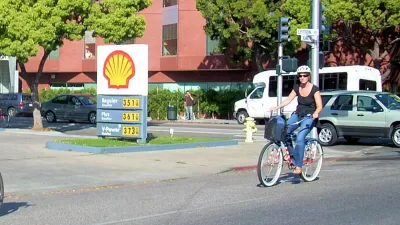American Petroleum Institute
New Methane Emission Regulations Aim for 45 Percent Reduction by 2025
President Barack Obama hopes to add to his "climate legacy" by having the EPA adopt the nation's first regulations to reduce methane emissions, the second most prevalent greenhouse gas emission after carbon dioxide, but far more powerful.

California's 'Hidden Gas Tax' Arrives, Goes Unnoticed
The oil industry was predicting motorist outrage and an increase in gas prices of around 70-cents due to the carbon charge effective in the state on January 1. Some prices increased 10-cents, but went largely unnoticed.
Mileage Fee Worries in the Golden State
California's mileage fee pilot program legislation is now law. Dan Weikel of the Los Angeles Times raises two concerns drivers have regarding the switch to a mileage-based fee from a gas tax: privacy and fairness.
Study: Residents Living Near Fracking Suffer Negative Health Impacts
Self-reported respiratory problems and skin irritations were significantly greater for those living near natural gas fracking wells in southwestern Pennsylvania than those living more than two kilometers away, according to a Yale University survey.
Oil and Rail Industries Agree to Phase Out Oldest Rail Oil Tank Cars
A deal may be near between energy and rail industries and the Department of Transportation to phase out the DOT-111 tank car—the same kind implicated in the horrific explosions of oil trains, particularly those carry Bakken crude from North Dakota.
DOT's Emergency Actions on Shipping Bakken Crude by Rail Fall Short
In what is being billed as the first emergency order of more to come, the Department of Transportation (DOT), the federal regulator of transporting crude oil by rail, hopes to quell the growing national furor over what some call 'ticking time bombs'.
EPA's New Rules for Clean Cars and Gasoline
In EPA’s leadership blog, Administrator Gina McCarthy announces the agency's new standards to reduce the sulfur content in gasoline by 60% in 2017 and new Tier 3 emission standards for cars and light trucks to reduce criteria and toxic air pollutants
Crude by Rail Declared 'Imminent Hazard' by Federal Regulators
The full declaration on CBR by DOT regulators was “an imminent hazard to public health and safety and the environment." An immediate safety order was issued requiring vigorous testing of crude and prohibition of use of some tanker cars.
NTSB Makes Urgent Recommendations to Address Crude-by-Rail Explosions
The National Transportation Safety Board called on federal regulators on Jan. 23 to approve several measures in light of a rash of oil train derailments and crude oil explosions as did their Canadian counterparts, the Transportation Safety Board.
Why are Crude Oil Trains Exploding Across North America?
Crude oil may be flammable, but until recently was not thought to be explosive. However, three recent oil train explosions all involving crude oil from the Bakken formation have prodded investigators to determine why Bakken crude is more explosive.
Does South Portland Oilsands Ban Spell Doom for Keystone XL "Plan B"?
South Portland, Maine's moratorium on shipments of Alberta oilsands products may signal a tough road ahead for a proposed alternative to the Keystone XL pipeline.
Pagination
Urban Design for Planners 1: Software Tools
This six-course series explores essential urban design concepts using open source software and equips planners with the tools they need to participate fully in the urban design process.
Planning for Universal Design
Learn the tools for implementing Universal Design in planning regulations.
Smith Gee Studio
Alamo Area Metropolitan Planning Organization
City of Santa Clarita
Institute for Housing and Urban Development Studies (IHS)
City of Grandview
Harvard GSD Executive Education
Toledo-Lucas County Plan Commissions
Salt Lake City
NYU Wagner Graduate School of Public Service


































